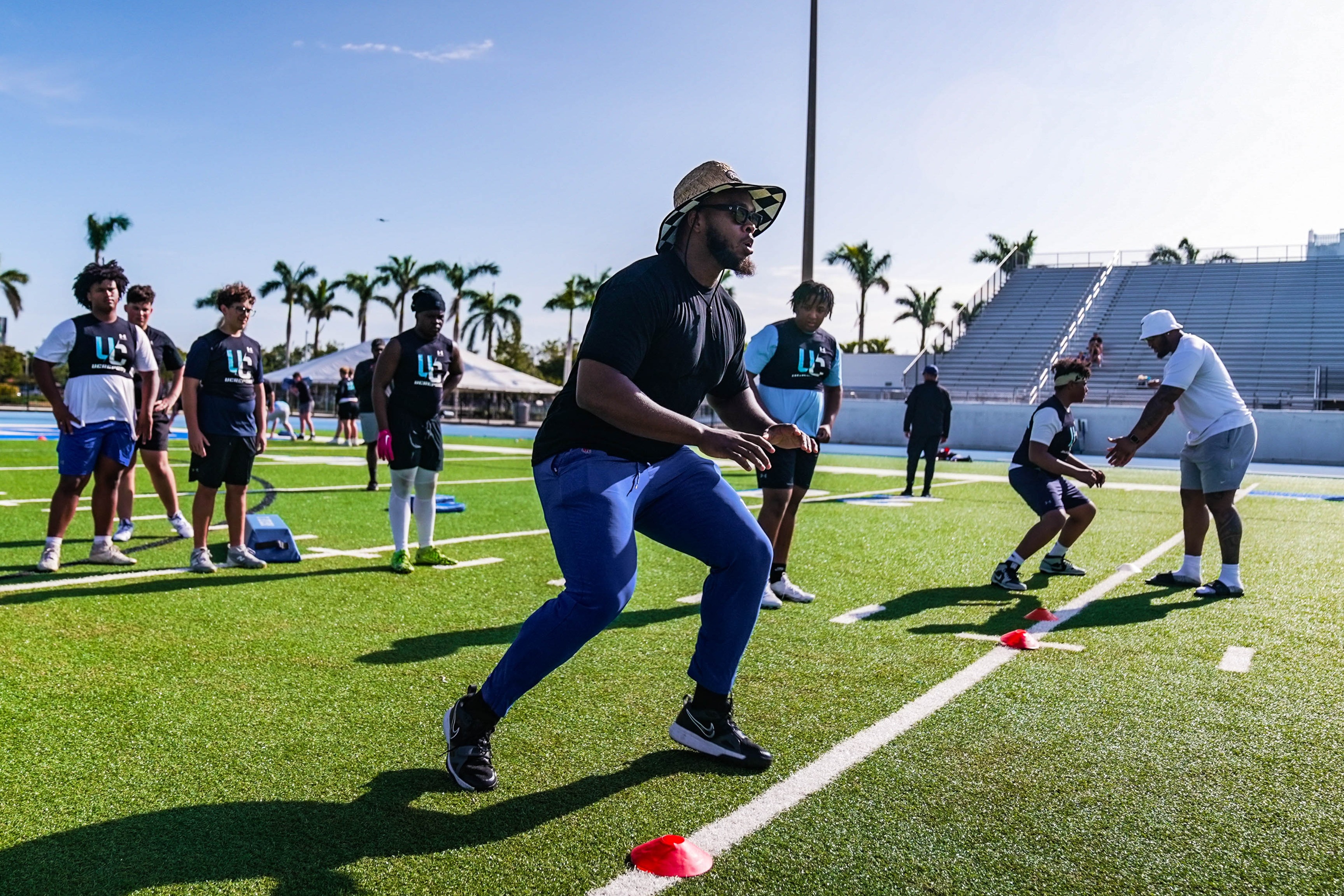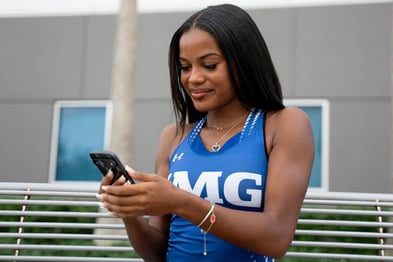Different Types of Camps and Combines for Recruiting Success

The different types of camps for high school student-athletes
Just because it’s the offseason for your school or club team, that doesn’t mean you can’t power-up your game or get yourself noticed by college coaches. High school student-athletes looking to get recruited can choose from a wide variety of sport-specific camps, combines and other events to bolster their profiles.
Sports summer camps for high school athletes fall into a few different categories.
Skill development
Camps like IMG Academy’s sport summer camps, which are geared toward improving athletes’ fundamentals and developing their skills, are a great way to sharpen your game as you move toward playing at the next level.
While development-focused camps won’t necessarily help you gain exposure, they offer top-level coaching that will help you harness and showcase your talent. We recommend this type of camp for athletes looking to improve their game in any year of high school.
Exposure
For athletes entering their junior or senior seasons and looking to get recruited, exposure-style camps offer a chance to play in front of coaches from your targeted schools or division level.
However, not every exposure-style sports camp is right for every athlete, and it’s important to be strategic when picking a camp to show off your game. Some sports camps are run by independent operators, but many are run by the colleges themselves.
Not all college-run camps are the same, and you should understand the different types of camps so you can commit to the one that best serves your recruiting needs.
Invite-only
Colleges often invite athletes to their sports camps, but very few sports camps are truly invite-only, and they tend to be for players at the highest levels. These camps are true “elite prospect days” and signify serious interest from the school.
Know the difference! It can be hard to distinguish between a generic camp invite and a personal one. If a coach references your highlight video, includes a way for you to contact them personally, or makes specific references to your game or your potential, it’s a personal invite and you are likely on their recruiting radar.
General skill camps
These camps are run by college programs and open to everyone. Camp tuition helps college teams support themselves, so schools are invested in promoting their camps. Coaches often invite hundreds of athletes as a way of raising interest in the camps, not necessarily because those players are top recruits. Still, you should never ignore a camp invite, and even an impersonal invitation is an opportunity to show coaches what you can offer.
Mega camp
So-called “mega camps” are hosted by one college but attended by coaches from many schools across multiple levels. These camps are an increasingly popular part of the college recruiting process, as they give athletes a chance for maximum exposure and an opportunity to gauge their level.
For more on how to choose the sports camp that’s right for you, see below.
Combines, Showcases and Tournaments
There are a variety of other options for student-athletes looking to build their recruiting profile in the off season.
Combines
Combines are usually run by third-party organizers, and though they’re not normally attended by college coaches, they offer a set of verified measurements that coaches can trust.
Coaches care a lot about the numbers when they’re trying to see how you stack up, and having verified combine measurements on your recruiting profile pages is a great way to show college programs you’re for real.
If you’re acing your off-season workouts and want to show programs you’re serious about your training, combine measurements carry a lot more weight than ones witnessed only by your teammates at the gym.
Showcases
Showcases are usually invite-only events where athletes get a chance to play in front of coaches and recruiters from many different colleges.
These events usually include sport-specific skills drills and opportunities to compete against other elite recruits in your sport.
Tournaments
Similar to showcases, tournaments are usually organized by third-party operators and allow recruits to compete against other top athletes in front of college coaches. It’s common for coaches to recruit at club tournaments.
How to choose a summer camp that’s right for you
Generally, athletes entering freshman or sophomore year of high school should look for camps where they will develop their skills, like IMG Academy’s summer sports camps.
Rising juniors should find exposure-style camps to get noticed.
If you want to find the right summer camp for your recruitment, you need to start by doing your research. Be honest about your own level, then look for camps where you’ll be a good fit.
You won’t catch much recruiting attention at a camp that’s above your level, and there’s no sense playing in front of a bunch of D3 coaches if you’re looking to go D1.
Once you’ve found some camps that look right for you, be proactive. Reach out to the camp organizers ahead of time and confirm which college coaches will be there. Since there are limitations to how much time and money you can invest in camp, you want to make it count.
How to get recruited at a camp
Once you’ve settled on the right camp, focus on making the most of your effort.
Contact coaches before you go
Reach out to any coaches who’ll be in attendance, especially if they’re from your targeted schools. As always, be polite and professional. Give a quick introduction that includes your position and grad year, tell them you’re looking forward to camp, and let them know you’re interested in their program. Make sure you introduce yourself in person at the camp as well.
Contacting coaches for the first time can be nerve-wracking, but you have nothing to fear. They’re used to it, even if you’re not. You should use your own words and be genuine, but a good introductory message to send before camp might say something like this:
Hello Coach McMurphy,
My name is Sam Roberts and I am a Class of ‘28 small forward at Sunnyside High School in Topeka. Here's the link to my NCSA Profile. I just uploaded a new highlight video! I’d love to get your feedback on my recent games.
I’ll be at camp with you at Archibald University next month, and I’m really looking forward to developing my game someplace that uses a high-energy, fast-paced offense like the ones I think I fit best in.
I’d love to be an Archie in a couple of years, and I’m hoping that at camp, I’ll see what I need to do to get myself there.
Can’t wait to meet you!
Be positive
Coaches recruiting at camps aren’t only looking to see what you do on the field. Camps are an opportunity for them to get a sense of your character and coachability. Be positive and support the athletes around you. Show your passion for your sport in a way that makes coaches excited to have you.
Do your best
Succeeding in sports means performing under pressure, and you want to bring your A-game to any sports camp. The time to get yourself in shape is not when you’re performing in front of college coaches. Make sure you arrive at camp physically and mentally prepared to give your top effort.
Follow up
After camp is over, maintain relationships with the coaches you’ve met by sending follow-up messages. Thank them for what you learned at camp, being as specific as you can be, and reiterating your interest in their program. Once you’ve established contact and played in front of a coach at a camp, it’s OK to be direct in asking if you’re on their school’s radar. A good follow-up message might look something like this: Hi Coach McMurphy,
I wanted to drop a note to say thank you again for a great week at camp. I’ve already incorporated Coach Tanana’s footwork drills into my daily routine, and the tip you gave me about the angle of my torso on fade-aways has really improved that shot for me.
Spending a week on the beautiful Archibald campus under great coaching only confirmed how much I’d love to play there in the future.
If you get a chance, I’d appreciate it if you could let me know if the interest is mutual, and what I can do to get my game to the Archie level.
Haven’t received a follow-up? Don’t worry, check out this guide to find out what you should know about divisions and timeline.
What does it mean if you get invited to a camp?
Some camps and showcases are run on an invite-only basis. These are usually reserved for top performers, and require a recommendation from your high school or club coach or a local recruiting expert.
Most sports camps are open to any athlete with interest and do not require an invitation.
If a coach or a school invites you to camp, that could be a good thing: It means you may be on their preliminary list of potential recruits.
But many colleges rely on summer sports camps to financially support their athletics programs, and invitations also serve to promote the camp in a way that makes it seem exclusive.
Still, you should never ignore a camp invite! If a coach or program reaches out to invite you to a camp that you cannot attend or will not attend, be sure to reply to thank them for their interest and let them know where they can see you play.
For student-athletes looking to get recruited, off-season events like sports camps, combines, tournaments and showcases offer an opportunity to shine in front of college coaches even after your season has ended. Whether you’re looking to develop your game or bolster your profile, attending a sports camp is a must!
If you’re looking to get your game to the next level with pro-caliber coaching and unparalleled facilities, sign up for an IMG Academy summer sports camp now!
Frequently Asked Questions
Can I go to a D1 school’s camp if I’m targeting D2?
Of course you can – maybe it’s right for you geographically, or financially, or socially, and any good sports camp will sharpen your skills and expose you to new techniques and training methods. But if your goal from a sports camp is getting recruited, it pays to be selective. Your time and your money are limited, and if you’re going to a sports camp for recruiting exposure, you want to be playing in front of coaches from your targeted programs and levels.
Do you need to attend an exposure-style camp to get recruited?
You don’t – plenty of athletes land on coaches’ radars through high school or club play, or even through social media. But showcasing yourself to as many college coaches as possible will help you land the most offers, and attending a camp might make the difference between having only one or two interested schools and having a much larger group to choose from.
Should I tell coaches if I’m going to a camp at a different school?
Yes. If you’re in contact with coaches from your targeted programs, you should always let them know when there’s going to be an opportunity to watch you perform. Schools often welcome coaches from other programs to their camps. Even if they can’t make it to see you in person, letting them know you’re attending a camp is a good way to keep communication flowing and show your dedication to your sport.
Like this article? Access more in the full resource library.
